Introduction to SEO and Its Importance

In today’s digital world, where competition has reached its peak, visibility in search engines is more important than ever.
This is where #SEO, or Search Engine Optimization, plays its vital role.
SEO is a process through which your website is optimized for higher ranking in the organic (non-paid) search results of search engines like Google, Bing, and Yahoo.
The main goal of SEO is to increase the quality and quantity of traffic to your website through search results.
Although the concept of SEO may seem complex at first, with a correct and step-by-step educational approach, anyone can learn its principles and improve their website.
SEO is not just about keywords or links; it’s about understanding how search engines work and what users are looking for.
A strong SEO strategy helps businesses stand out among billions of web pages and reach their target audience.
Ignoring SEO means losing countless opportunities for online growth and development, as most users only look at the first pages of search results.
In fact, SEO is the key to unlocking the gates of organic and sustainable traffic that can ensure your long-term success.
Therefore, any investment in SEO improvement is considered a smart investment for your digital future.
Did you know that 85% of customers check your company’s website before any interaction?
With RasaWeb, build a corporate website that deserves your credibility.
✅ Increase customer credibility and trust
✅ Attract high-quality leads
⚡ Get free website design consultation
Keyword Research: The Backbone of SEO
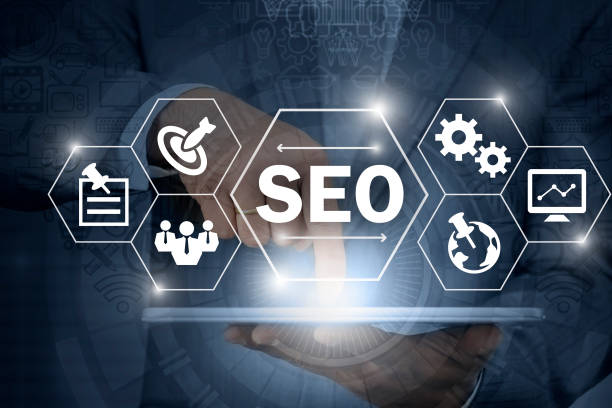
Keyword research, as one of the most fundamental steps in any SEO strategy, is a process of identifying and analyzing the words and phrases users employ to search for your information, products, or services on search engines.
This step not only helps you understand the language your audience uses but also provides deep insights into their needs and questions.
A specialized keyword research involves finding keywords with suitable search volume, manageable competition, and high relevance to your content.
Tools like Google Keyword Planner, Ahrefs, SEMrush, and KWFinder are very useful in this regard.
Choosing the right keywords allows you to create content that exactly matches what users are looking for, thereby increasing your chances of being seen in search results.
Focusing on Long-Tail Keywords is also highly important; these are longer and more specific search phrases that, although having lower search volume, bring a higher conversion rate because they indicate user intent more precisely.
Understanding how keywords function in the marketing funnel and which keywords are most suitable for users at each stage adds more depth to your SEO strategy.
This analytical approach helps you produce more targeted content that not only attracts more visitors but also guides the right visitors, who are likely to convert into customers, to your website.
On-Page SEO Optimization
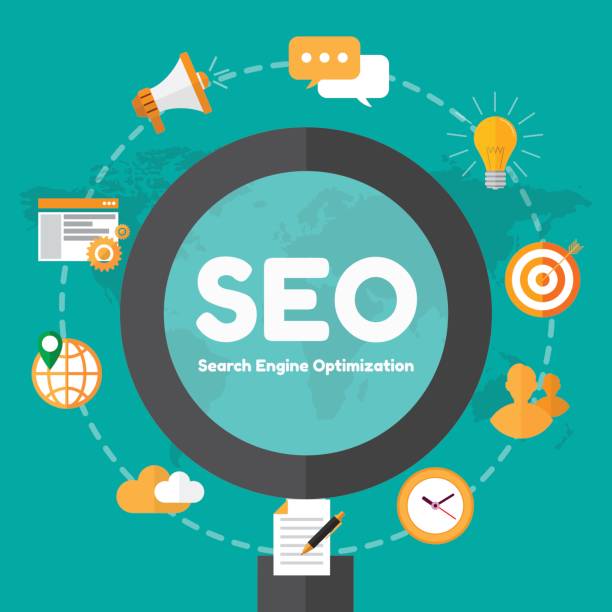
On-page optimization is a set of techniques applied directly to a website’s content and its HTML code to improve its ranking in search results.
This aspect of SEO includes optimizing elements visible to users as well as elements read by search engines.
Among the most important On-Page SEO elements are the Title Tag, Meta Description, keyword usage in the text, URL structure, image optimization (Image Alt Text), heading structure (H1, H2, etc.), and internal links.
The title tag should be appealing and include the page’s main keyword, while the meta description should provide a descriptive and compelling summary of the page’s content, encouraging users to click.
Keyword density, though not as crucial as it once was, still matters in terms of natural and relevant usage in the content.
Furthermore, page loading speed and mobile-friendliness are very important factors in SEO ranking.
A good User Experience (UX) plays a significant role in reducing bounce rate and increasing user time spent on the site, which indirectly positively affect SEO.
Below is a table comparing effective and ineffective elements in on-page SEO:
| SEO Element | Effective Approach | Ineffective (or Harmful) Approach |
|---|---|---|
| Title Tag | Unique, includes main keyword, short and attractive | Repetitive, includes too many keywords (keyword stuffing), too long or too short |
| Meta Description | Accurate and compelling summary, includes Call to Action (CTA) | Copied, irrelevant, too long or just a list of keywords |
| Content | High quality, comprehensive, unique, answers user needs, natural use of keywords | Incomplete, copied, filled with irrelevant keywords, short and worthless content |
| Internal Links | Logical, relevant, proper anchor text usage | Too many or too few, irrelevant, uses generic anchor text (like “click here”) |
| Site Speed | High (under 2 seconds), optimized for mobile | Slow, full of heavy files and scripts |
Off-Page SEO and Link Building
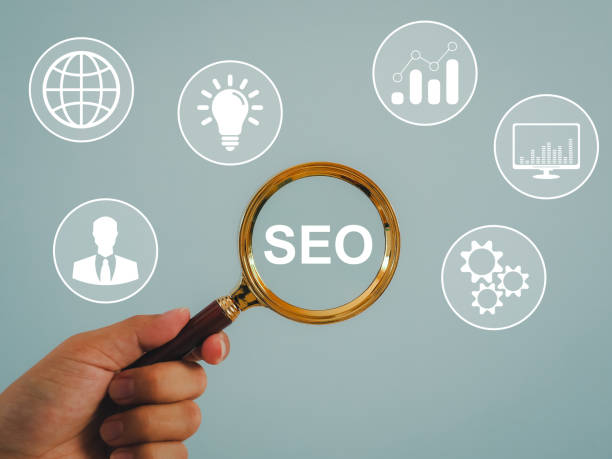
While on-page optimization focuses on elements within your website, Off-Page SEO refers to activities performed outside your website that help improve its ranking in search results.
Link building or Backlink Building is the core of Off-Page SEO. Backlinks, or incoming links from other websites to your site, act like votes of confidence and show search engines that your content is valuable and authoritative.
The more numerous and higher quality the backlinks, the higher your Domain Authority will be, and consequently, your SEO ranking will improve.
However, the quality of links is more important than their quantity; one link from a reputable and relevant website is far more valuable than dozens of links from low-quality and spammy websites.
Link building strategies include producing valuable content that others link to, outreach or contacting bloggers and site owners, submitting content to directories and news platforms, and social media activity.
Social media activity, although not directly affecting SEO rankings, can help increase website visibility and organic traffic, and indirectly, boost the chances of getting backlinks.
A key guideline in Off-Page SEO is to focus on building natural relationships and creating content that naturally attracts links, rather than simply buying links or using spammy methods that can lead to penalties by Google.
Successful SEO requires a balance between On-Page and Off-Page optimizations.
How much does losing business leads due to an unprofessional website cost you? Solve this problem forever with professional corporate website design by RasaWeb!
✅ Increase credibility and trust of potential customers
✅ Easier attraction of new business leads
⚡ Get free consultation right now!
Technical SEO for Better Performance

Technical SEO focuses on optimizing the technical aspects of your website so that search engines can crawl and index it more effectively.
This part of SEO is less about content and more about the website’s infrastructure.
Page Speed is one of the most important technical SEO factors; slow sites provide a poor user experience and are penalized by Google.
Optimizing images, compressing codes (HTML, CSS, JavaScript), and using a CDN (Content Delivery Network) can help improve speed.
Mobile-Friendliness is also highly important, as most searches nowadays are performed via mobile devices.
A website must be properly viewable and usable on all screen sizes without issues.
Other important technical SEO elements include using HTTPS for security, implementing Schema Markup (structured data) to help search engines better understand content, managing 404 errors, creating a robots.txt file to guide crawlers, and XML Sitemaps for more efficient page indexing.
Monitoring Crawl Errors in Google Search Console and regularly running page speed tests are essential for a precise analytical assessment of the website’s technical status.
Technical SEO is the foundation of a strong SEO-optimized website; without a healthy technical infrastructure, even the best content and strongest backlinks cannot fully display their potential in search results.
Quality Content Production and SEO

Content is king; this phrase never gets old in the world of SEO.
Producing high-quality and valuable content not only attracts users and addresses their needs but also shows search engines that your website is a credible and trustworthy source.
Quality content is not just about stuffing a page with keywords; it means providing comprehensive, accurate, unique, and engaging information that answers user questions or solves their problems.
This content can include blog articles, guides, videos, infographics, podcasts, and even thought-provoking and entertaining content that encourages user interaction.
Your content strategy should be shaped based on keyword research and understanding your target audience.
Content written for readers, not just for search engines, has a higher chance of ranking well and attracting organic traffic.
Content length can also be important; studies show that longer, more comprehensive content (with more details) generally performs better in search results, provided that every word adds value.
Regularly updating old content and adding new information sends a positive signal to search engines that your website is dynamic and relevant.
Ultimately, sharing your content on social media and other platforms helps increase its reach and visibility, and can lead to attracting natural backlinks and overall SEO improvement.
Local and International SEO
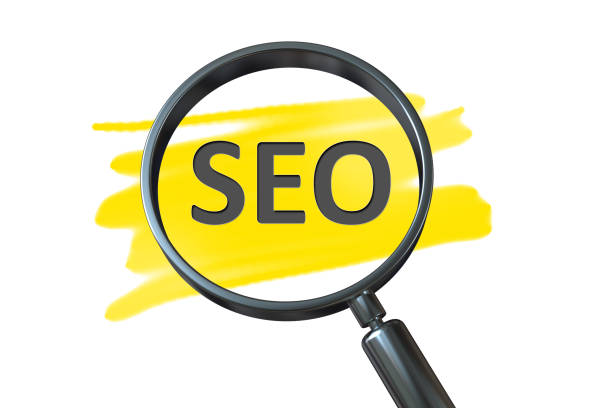
Local SEO and International SEO are two specialized aspects of SEO that gain importance depending on your business goals.
Local SEO is crucial for businesses that offer their services in a specific geographical area. The goal of local SEO is to place your business at the top of local search results, such as “restaurant near me” or “Tehran plumbing services”.
Registering and optimizing your Google My Business (GMB) profile, collecting customer reviews, creating Citations (mentions of business name, address, and phone number on various websites), and optimizing local keywords are among the most important activities in local SEO.
News regarding Google algorithm updates often includes changes that affect local rankings, so keeping track of them is essential.
On the other hand, International SEO is designed for websites that aim to reach audiences in different countries and with different languages. This involves unique challenges such as managing country code top-level domains (ccTLD), using hreflang tags to specify the target language and region for search engines, content translation, and optimization for local search engines in different countries.
Choosing the appropriate URL structure (such as subfolders, subdomains, or ccTLDs) and ensuring that content is correctly translated and localized for different cultures are key factors for success in international SEO.
Below is a table comparing Local and International SEO:
| Feature | Local SEO | International SEO |
|---|---|---|
| Primary Goal | Attracting customers in a specific geographical area | Reaching audiences in different countries and languages |
| Key Tools | Google My Business, Local Citations, Review Management | Hreflang Tags, ccTLDs, Geotargeting in Search Console |
| Keywords | Includes city/region name (e.g., “Saadat Abad coffee shop”) | Translated and localized based on each country’s language and culture |
| Content | Based on local needs and regional events | Full translation and localization, considering cultural differences |
| Backlinks | From local websites and directories | From authoritative and relevant websites in each country/language |
SEO Tools and Data Analysis

Using the right tools is an integral part of a successful SEO strategy.
These tools allow you to monitor your website’s performance, identify strengths and weaknesses, and discover new opportunities for ranking improvement.
Google Analytics and Google Search Console are two free and essential tools from Google that provide vital information about website traffic, keywords, page performance, crawl errors, and backlinks.
Google Analytics helps you understand user behavior on your website, such as the number of visitors, time spent, and bounce rate.
Meanwhile, Google Search Console provides insights into how Google interacts with your website, including its appearance in search results and any indexing issues.
In addition to these free tools, specialized paid tools like Ahrefs, SEMrush, Moz, and Screaming Frog offer more advanced capabilities for keyword research, competitor backlink analysis, technical site audits, and rank tracking.
By collecting and analyzing a vast amount of data, these tools help you make data-driven decisions and optimize your SEO strategy.
Data analysis allows you to identify market trends, measure the performance of your campaigns, and devise new strategies for traffic growth and improved visibility in search engines.
Knowledge of using these tools and the ability to correctly interpret data is a very important skill in the modern SEO world and helps you surpass your competitors.
Does your current e-commerce website design lead to lost customers and sales?
RasaWeb is your solution, with modern and user-friendly e-commerce website designs!
✅ Significant increase in conversion rates and sales
✅ Strong branding and building customer trust
⚡ Get a free e-commerce website design consultation from RasaWeb!
Challenges and Future Trends of SEO

The world of SEO is constantly changing, and what is effective today might be obsolete tomorrow.
Google algorithm updates are one of the biggest challenges facing SEO professionals.
These updates can significantly impact website rankings and require a continuous adaptive approach and constant adaptability.
Future SEO trends include the increasing importance of Artificial Intelligence (AI) in searches, Voice Search SEO, Video SEO, and Visual Search.
AI, such as Google RankBrain and BERT, are changing how Google understands search queries and page content, which further emphasizes the importance of producing natural content relevant to user intent.
Voice SEO is also growing due to the increased use of voice assistants like Siri and Alexa; optimizing for voice searches requires focusing on conversational keywords and direct answers.
Video SEO, given the popularity of platforms like YouTube, has also become a crucial part of content strategy.
Optimizing video titles, descriptions, and tags, as well as using schema markup for videos, can help improve their visibility in search results.
Finally, with the emergence of technologies like Augmented Reality (AR) and Virtual Reality (VR), visual search is also gaining importance.
The future of SEO requires flexibility, the ability to analyze new trends, and readiness to adapt to rapid changes in search technology.
SEO professionals must constantly be learning and updating their knowledge to succeed in this dynamic environment.
Sustainable SEO and Long-Term Strategies
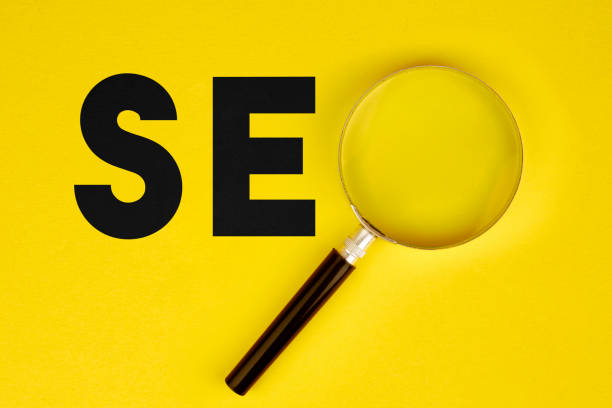
SEO is a marathon, not a sprint.
Achieving desired results in SEO requires patience, consistency, and a long-term strategy.
Focusing on ethical SEO principles (White Hat SEO) and avoiding Black Hat SEO tactics, which might lead to short-term ranking boosts but ultimately result in penalties by search engines, is of paramount importance.
Sustainable strategies include regularly producing high-quality and unique content, building a natural and diverse backlink profile, continuously improving user experience and site speed, and constantly monitoring website performance and analyzing competitors.
One of the key aspects of sustainable SEO is building Trust & Authority over time.
This is achieved by providing reliable content, answering user questions, receiving natural backlinks from authoritative sources, and maintaining a strong online profile.
SEO is not only about attracting new traffic but also about retaining and increasing current traffic.
Updating old content, fixing broken links, and monitoring keyword rankings are among the activities that help maintain your rankings’ stability.
Ultimately, SEO is not a static process; rather, it is a dynamic and evolutionary process that requires continuous attention and investment.
By implementing a comprehensive and sustainable strategy, businesses can achieve a powerful and lasting online presence and benefit from organic and targeted traffic.
Successful SEO is a path towards visibility and sustainable growth in the competitive web world.
Frequently Asked Questions
| Question | Answer |
|---|---|
| What is SEO? | SEO, or Search Engine Optimization, is a process for increasing the quality and quantity of website traffic by improving the site’s ranking in natural (organic) search engine results like Google. |
| What are the main types of SEO? | SEO is divided into three main categories: On-Page SEO, Off-Page SEO, and Technical SEO. |
| What does On-Page SEO include? | On-Page SEO includes optimizing elements within the website, such as keywords, Title Tags, Meta Descriptions, content, URL structure, images, and internal links. |
| What is Off-Page SEO? | Off-Page SEO refers to activities outside the website that help improve its ranking, such as Backlink Building, social media marketing, and Brand Mentions. |
| What is Technical SEO? | Technical SEO focuses on optimizing the technical aspects of a website to help search engines crawl and index it better. This includes site speed, mobile-friendliness, site structure, Sitemaps, and the Robots.txt file. |
| What role do Keywords play in SEO? | Keywords are phrases that users enter into search engines. Proper and targeted use of relevant keywords in content and site elements helps search engines understand your page’s topic and display it for relevant searches. |
| What is a Backlink and why is it important? | A backlink, or inbound link, is a link from one website to another. Backlinks act as a “vote of confidence” from other sites for search engines and play a significant role in a site’s authority and ranking increase, especially if they come from reputable sites. |
| What impact does quality content have on SEO? | High-quality, relevant, comprehensive, and unique content not only attracts and retains users but also shows search engines that your page is valuable. This helps improve ranking, reduce Bounce Rate, and increase user time spent on the site. |
| Why is site loading speed important for SEO? | Site loading speed is an important ranking factor for Google. Faster sites provide a better user experience, have lower bounce rates, and are preferred by search engines. |
| Is SEO a one-time process? | No, SEO is a continuous and long-term process. Search engine algorithms are constantly changing, competition is increasing, and website content also needs updating. Therefore, SEO requires continuous monitoring, analysis, and optimization. |
And other services of Rasa Web Advertising Agency in the field of advertising
Smart Digital Advertising: Transform digital branding with the help of an SEO-driven content strategy.
Smart SEO: Transform user engagement with the help of real data.
Smart Data Analysis: A new service for increasing website traffic through the use of real data.
Smart Website Development: A professional solution for increasing click-through rates with a focus on smart data analysis.
Smart Marketing Automation: An innovative platform for improving sales growth with marketing automation.
And hundreds of other services in the field of internet advertising, advertising consulting, and organizational solutions
Internet Advertising | Advertising Strategy | Advertorial
Sources
Advanced SEO Training
Comprehensive SEO Guide
Website Optimization for SEO
Key SEO Tips
? Are you ready to transform your business in the digital space? RasaWeb Afarin Digital Marketing Agency, by providing comprehensive and specialized services, is your guide on the path to online brilliance. With years of experience, we help businesses establish a powerful and effective presence in the digital world.
From Search Engine Optimization (SEO) and content marketing strategies to responsive website design and targeted advertising campaigns, we cover all your digital needs. Our goal is to increase your visibility, attract more customers, and ultimately ensure the sustainable growth of your business.
By trusting the expertise of the RasaWeb Afarin team, you can confidently entrust the digital future of your business to us. We are committed to achieving the best results for you and ensuring that your brand shines in today’s competitive landscape. With RasaWeb Afarin, take a firm step towards great successes.
📍 Tehran, Mirdamad Street, next to Central Bank, Southern Kazeroun Alley, Ramin Alley, No. 6


